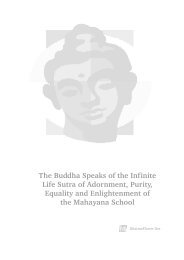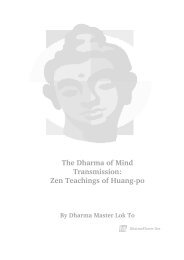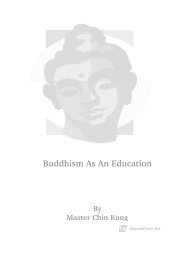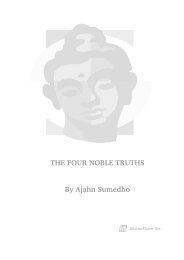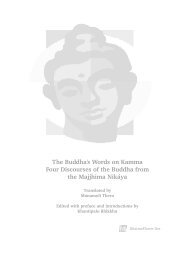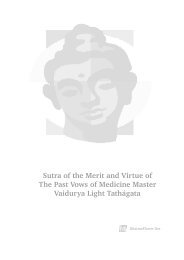Vipassana Meditation : Lectures On Insight Meditation by Venerable
Vipassana Meditation : Lectures On Insight Meditation by Venerable
Vipassana Meditation : Lectures On Insight Meditation by Venerable
You also want an ePaper? Increase the reach of your titles
YUMPU automatically turns print PDFs into web optimized ePapers that Google loves.
That means, he can attain Arahantship when he is completely purifiedfrom all kinds of defilements. This is the first benefit.The Second Benefit of mindfulness is the overcoming of sorrow and worry.You will not be worried about failure, or be sorry about the death of yourrelatives, or about the loss of your work. You will not be sorry about anythingif you practice this mindfulness meditation. Although you have not attainedany Path and Fruition (Magga and phala), you can overcome sorrow andworry to some extent, because when sorrow or worry arises, you will bemindful of it as it is. When mindfulness becomes powerful, that worry orsorrow will stop and disappear. When you have completely developedmindfulness meditation, you are sure to attain Arahantship, and hence be freefrom worry and sorrow permanently. In this way, worry and sorrow can beovercome <strong>by</strong> mindfulness meditation.The Third Benefit is that of overcoming lamentation. Although yourparents, children or relatives die, you will not have any lamentation for thembecause you have fully realized that mental and physical processes constitutethe so-called 'child' or the so-called 'parents'. In this way, lamentation can beovercome <strong>by</strong> mindfulness meditation. Regarding the third benefit, thecommentary on the Maha Satipatthána Sutta mentions a story: A woman,named Patacara, whose husband, two sons, parents and brothers had diedwithin a day or two, went mad due to sorrow, worry and lamentation. She wasoverwhelmed <strong>by</strong> sorrow over the death of the people she loved.The commentary mentions this story as proof that one can overcomesorrow, worry and lamentation <strong>by</strong> means of mindfulness meditation.<strong>On</strong>e day, the Buddha was giving a discourse to an audience at Jetavanamonastery near Savatthi. Then this mad woman, who was going for a stroll,went into the monastery and saw the audience listening to the discourse. Sheapproached the audience. An old man, who was very kind to the poor, took offhis upper robe threw it to the woman and said to her. "Dear daughter, pleaseuse my robe to cover your body." At the same time the Buddha said to her,"Dear sister, be mindful." Because of the soothing voice of the Buddha, the madwoman came to her senses. She then sat at the edge of the audience andlistened to the discourse. The Buddha, knowing that she had come to hersenses, aimed his discourse at her. Listening to the discourse given <strong>by</strong> theBuddha, the woman's mind gradually absorbed the essence of the doctrine.When her mind was well prepared to realize the Dhamma, the Buddhaexpounded the Four Noble Truths:-1. Dukkha-sacca (The Truth of Suffering)2. Samudaya-sacca (The Truth of the Cause of Suffering)3. Nirodha-sacca (The Truth of the Cessation of Suffering)22



